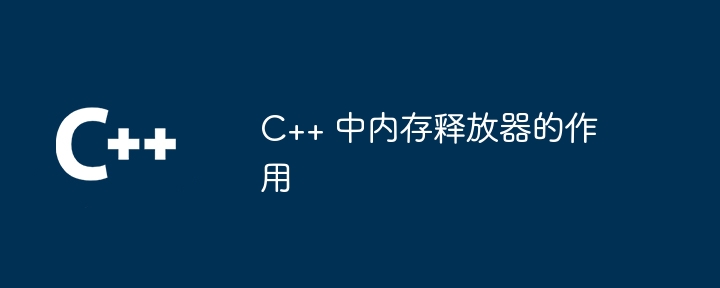
Memory freers in C help prevent memory leaks by automatically releasing objects that are no longer used. The releaser provides object life cycle management, tracks object usage and automatically releases memory. Usage methods include: creating a releaser, using the releaser to manage objects, and the releaser automatically releases memory. Releasers improve program quality, prevent memory leaks, and ensure that memory is released when objects that are no longer referenced are used.

Memory freer in C: Keeping you away from memory leaks
In C, memory management is a must face for programmers Right an important question. Improperly freeing memory can result in a memory leak, which can seriously harm your program's performance and stability. The memory freer is a key tool that can help you automatically release memory and prevent memory leaks.
How the memory freer works
The memory freer is a library or framework that provides an object life cycle management mechanism. Programmers can use freers to create and manage objects without worrying about releasing them manually. Releasers work by tracking object usage and automatically releasing objects that are no longer used.
Practical case: Use releasers to prevent memory leaks
The following example demonstrates how to use releasers to prevent memory leaks:
#include <memory>
int main() {
// 创建一个释放器
std::unique_ptr<int> ptr = std::make_unique<int>(10);
// ...
// 释放器自动释放内存
}In this example , std::unique_ptr is a freer that ensures that the int object is released when ptr is no longer referenced. This means you don't need to manually free the memory, thus eliminating the possibility of memory leaks.
Conclusion
The memory freer is a powerful tool in C that can help you prevent memory leaks and improve the quality of your program. By understanding how they work and how to use them, you can write more efficient and stable code.
The above is the detailed content of The role of memory freer in C++. For more information, please follow other related articles on the PHP Chinese website!
 What are the differences between c++ and c language
What are the differences between c++ and c language
 Recommended learning order for c++ and python
Recommended learning order for c++ and python
 Cost-effectiveness analysis of learning python and c++
Cost-effectiveness analysis of learning python and c++
 Is c language the same as c++?
Is c language the same as c++?
 Which is better to learn first, c language or c++?
Which is better to learn first, c language or c++?
 The difference and connection between c language and c++
The difference and connection between c language and c++
 C++ software Chinese change tutorial
C++ software Chinese change tutorial
 Cost-effectiveness analysis of learning python, java and c++
Cost-effectiveness analysis of learning python, java and c++




